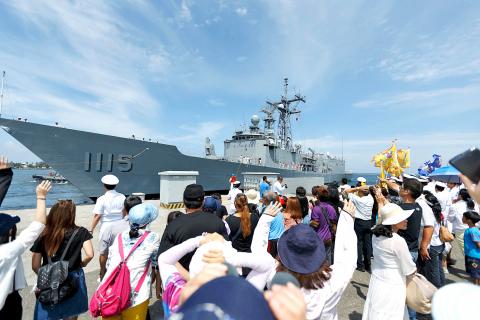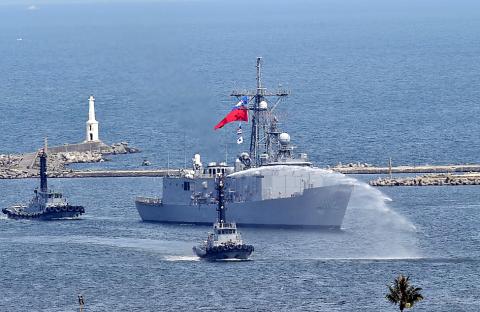Two Perry-class guided-missile frigates purchased from the US arrived in Kaohsiung yesterday, an acquisition that the Republic of China (ROC) Navy said will increase its anti-submarine capability.
Flying ROC national flags, the vessels, crewed by Taiwanese, sailed into Zuoying Military Harbor in Kaohsiung at about 9:30am, where a welcoming ceremony was held by the military.
A commissioning ceremony is slated for July next year, according to military sources.

Photo: CNA
The ships — which were cheaper than Taiwanese-made Cheng Kung-class frigates, the design of which is based on Perry-class frigates — were built in the 1980s.
The navy renamed them Ming Chuan No. 1112 and Feng Chia No. 1115.
They are to join the navy’s 146th fleet based on the outlying island of Penghu, from where they are to patrol the Taiwan Strait, the sources said.

Photo: Chang Chung-yi, Taipei Times
Perry-class frigates have high mobility and are equipped with the SQQ-89 undersea warfare combat system and the SQR-19 sonar system, both of which the military said would beef up its anti-submarine capabilities.
Then-US president Barack Obama signed a bill into law in December 2014 that authorized the sale of four Perry-class frigates to Taiwan.
Taipei budgeted about NT$5.5 billion (US$182 million at today’s exchange rate) in 2014 to purchase two of the ships, which were formerly named the USS Taylor (EFG-50) and the USS Gary (EFG-51) of the US Navy.
Admiral Huang Shu-kuang (黃曙光), commander of the ROC Navy, and family members of the crew were at the port to welcome the ships as they docked.
An official who declined to be named said the navy had been working with its US counterpart since May last year to bring the ships to Taiwan, adding that the crew underwent 10 months of tests and training with the US military.
The frigates are to be fitted with new equipment, while officers will be trained with the new ships before they are added into the naval force, the official said.
“Maintaining security and unimpeded passage in the waters around Taiwan is the navy’s greatest responsibility. We hope we will continue to have support in making arms purchases to ensure we can undertake this responsibility,” the sources said.
The numbering of the frigates — 1112 and 1115 — follows a convention in which the last two numbers of a ship’s name cannot add up to four, nor can the last digit be a four, the official said.
Case of all the digits adding up to four are also not used.
Four in Chinese has a similar pronunciation to the Chinese word for “die” (si, 死).
“The idea is that we hope officers will not be distracted by what might be perceived as an ominous ship name,” the official said, adding that as the previous Cheng Kung-class vessel to be added to the fleet was No. 1110, and 1111 adds up to four, the new ships were numbered starting from 1112.

The Taiwanese passport ranked 33rd in a global listing of passports by convenience this month, rising three places from last month’s ranking, but matching its position in January last year. The Henley Passport Index, an international ranking of passports by the number of designations its holder can travel to without a visa, showed that the Taiwan passport enables holders to travel to 139 countries and territories without a visa. Singapore’s passport was ranked the most powerful with visa-free access to 192 destinations out of 227, according to the index published on Tuesday by UK-based migration investment consultancy firm Henley and Partners. Japan’s and

NATIONAL SECURITY THREAT: An official said that Guan Guan’s comments had gone beyond the threshold of free speech, as she advocated for the destruction of the ROC China-born media influencer Guan Guan’s (關關) residency permit has been revoked for repeatedly posting pro-China content that threatens national security, the National Immigration Agency said yesterday. Guan Guan has said many controversial things in her videos posted to Douyin (抖音), including “the red flag will soon be painted all over Taiwan” and “Taiwan is an inseparable part of China,” while expressing hope for expedited “reunification.” The agency received multiple reports alleging that Guan Guan had advocated for armed reunification last year. After investigating, the agency last month issued a notice requiring her to appear and account for her actions. Guan Guan appeared as required,

Japan and the Philippines yesterday signed a defense pact that would allow the tax-free provision of ammunition, fuel, food and other necessities when their forces stage joint training to boost deterrence against China’s growing aggression in the region and to bolster their preparation for natural disasters. Japan has faced increasing political, trade and security tensions with China, which was angered by Japanese Prime Minister Sanae Takaichi’s remark that a Chinese attack on Taiwan would be a survival-threatening situation for Japan, triggering a military response. Japan and the Philippines have also had separate territorial conflicts with Beijing in the East and South China

A strong cold air mass is expected to arrive tonight, bringing a change in weather and a drop in temperature, the Central Weather Administration (CWA) said. The coldest time would be early on Thursday morning, with temperatures in some areas dipping as low as 8°C, it said. Daytime highs yesterday were 22°C to 24°C in northern and eastern Taiwan, and about 25°C to 28°C in the central and southern regions, it said. However, nighttime lows would dip to about 15°C to 16°C in central and northern Taiwan as well as the northeast, and 17°C to 19°C elsewhere, it said. Tropical Storm Nokaen, currently